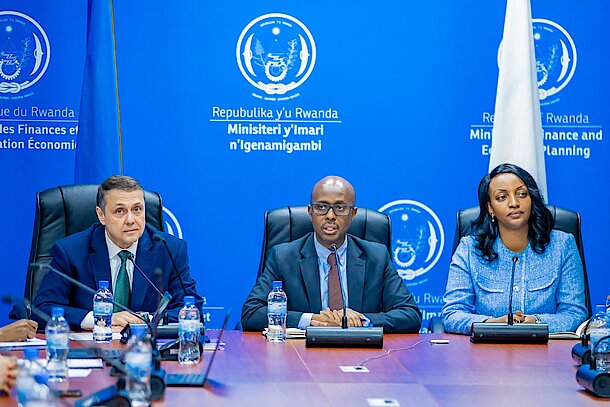
The Government of Rwanda and IMF staff have reached a staff-level agreement under the fifth review of the Policy Coordination Instrument (PCI), which has been in place since December 2022. Over the past two weeks of constructive discussions, it was reaffirmed that Rwanda’s economy remains strong and resilient, maintaining a positive outlook despite ongoing global and domestic challenges.
This is reflected in Rwanda’s impressive 8.9% GDP growth in 2024, placing it among the fastest-growing economies in sub-Saharan Africa, driven by strong performance across agriculture, industry (particularly construction), and services such as trade, tourism, transport, and telecommunications. Labor market conditions also improved, with a notable increase in labor force participation and a drop in the unemployment rate in 2024.
Macroeconomic conditions continued to improve. Inflation stabilized within the National Bank of Rwanda’s target range at 4.8% by end 2024, driven by improved food production and effective monetary policy. The fiscal deficit came in lower than expected, supported by stronger-than-projected tax revenues and well-targeted spending on capital projects and VAT refunds. Rwanda’s financial sector remained sound, with robust credit growth and a decline in non-performing loans, while improvements in Q4 exports and sustained multilateral inflows helped ease external pressures and stabilize the Rwandan franc, which depreciated by only 9.4%, down from 18% in 2023. International reserves increased to 5.4 months of import coverage, at the end of 2024 enhancing resilience to external shocks.
This strong performance is fully aligned with the PCI program objectives. All quantitative targets were met, and key structural reforms-including those on domestic revenue mobilization, SOE fiscal risk monitoring, corporate governance, and financial statistics transparency-were successfully completed. The completion of the IMF Standby Credit Facility (SCF) in February 2025 also played a critical role in stabilizing external imbalances and boosting reserves.
Looking ahead, the newly approved tax package is expected to further enhance revenue mobilization, placing the tax-to-GDP ratio on a positive trajectory. In 2025, Rwanda will also launch Phase II of the Bugesera International Airport and the expansion of RwandAir, in partnership with the Qatar Investment Authority. These strategic investments are expected to strengthen long-term growth and regional connectivity, while preserving fiscal sustainability and rebuilding the policy space needed to respond to future shocks. (End)
